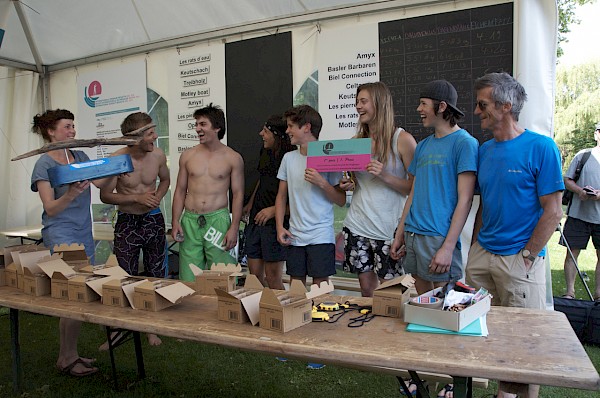 © ArchaeoConcept
© ArchaeoConceptFirst international prehistoric logboat regatta (Biel/Bienne, Switzerland)
2014Following the event organised for the International Museum Day in May 2014 and the success of the public and the archaeologists present, ArchaeoConcept and the New Museum Biel (NMB) have decided to initiate a travelling event of prehistoric dugout canoe regattas involving the five other countries concerned by the inscription of the palafittic sites around the Alps on the UNESCO World Heritage List: Switzerland, France, Germany, Austria, Italy and Slovenia until 2021. The project consists of a two-day meeting. The first day is devoted to a race of monoxyle canoes based on prehistoric models organised by the host country on the banks of a lake or river. The second day is reserved for a round table for specialists and researchers. It is essentially a space for exchange and discussion. The first international regatta of prehistoric pirogues took place on Lake Biel on Sunday 31 May 2015. It was followed on Monday 1 June by the round table on experimental archaeology at the New Museum Biel (NMB). Four boats, including two from the Museum of Prehistory in Zug, one from Lake Keutschach in Austria and the trusty Xiphia, and fourteen teams attended. The participants came from Biel, Neuchâtel, Yverdon-les-Bains, Bern, Basel, Austria (Keutschach), Ireland, England and Slovenia. Many specialists took part not only in the race, but also in the discussion about the experimentation with the boats. Practitioners spoke about the challenges and pleasures of building ancient canoes in Switzerland (Zug - Biel - Neuchâtel), Ireland, England (Buster Farm), France and Austria (Keutschacher See).
Related content
- International regatta of prehistoric logboats in Wangen (Germany)
- Fifth international prehistoric logboat regatta in Lago di Ledro (Italy)
- Fourth international prehistoric logboat regatta in Aiguebelette (France)
- Second International Prehistoric Dugout Canoe Regatta (Attersee, Austria)
- Archaeology
- Switzerland
- International
- Experimental archaeology
- UNESCO
- Event
- Colloquium
- Participatory approach
- Organisation
- Multilingual